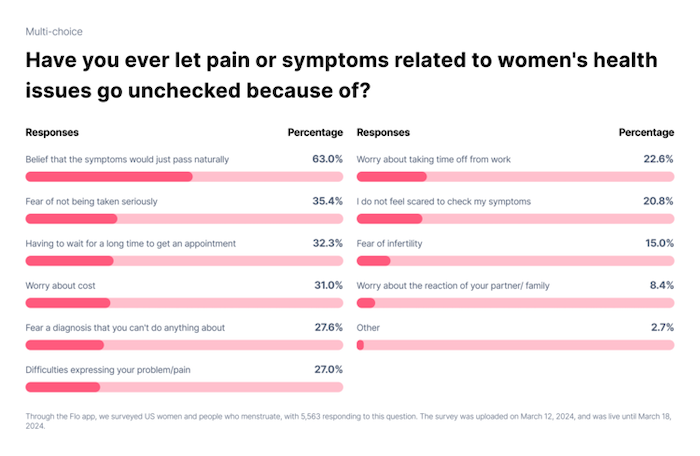Abstract
Out of fear of being invalidated and gaslighted by healthcare professionals, many women don’t come forward with symptoms — putting their health in jeopardy.
In a society that often ignores and invalidates womens’ pain, many women are left to suffer in silence.
Sumarie Engelbrecht is one such woman. For years, Engelbrecht experienced severe menstrual pain, fatigue, and a host of other symptoms that significantly impacted her daily life. Despite numerous visits to various doctors, her concerns were often dismissed as normal period pain or stress-related issues.
“Being repeatedly dismissed created a sense of distrust in the healthcare system and eroded my confidence in seeking help. It wasn’t just the pain that was debilitating; it was the ongoing battle to be heard and believed. This invalidation made me question my own perceptions and contributed to a sense of powerlessness.” – Sumarie Engelbrecht
This gaslighting by the medical system can lead to a form of trauma that can have long-lasting impacts, she explains. Constantly being told that nothing is wrong, or that the pain is exaggerated, can destroy one’s self-trust and self-esteem.
“I felt invisible and unheard, which contributed to a growing sense of anxiety and depression which I still struggle with today,” she says.
Eventually, after repeated efforts to be taken seriously by doctors and a period of refraining from seeking help at all, Engelbrecht was diagnosed with Adenomyosis and polycystic ovary syndrome (PCOS), providing a much-needed explanation for the difficult symptoms she had long faced without proper care or acknowledgment.
A widespread issue
Engelbrecht is far from the only woman who’s experienced invalidation in a medical setting.
According to a recent Flo Health survey of individuals who menstruate, over a third of the 5,563 respondents admitted to leaving issues unchecked due to a fear of “not being taken seriously.” Another 37% meanwhile felt that doctors “might not fully understand their experience.”

A new report from Siftwell found that 26% of female respondents reported struggles of not being believed or listened to by healthcare providers.
Research has shown that this experience is even more prevalent for Black women, with studies suggesting that stereotypes contribute to nurses and healthcare providers gaslighting and dismissing their health concerns.
“Women may have had negative experiences with their health care provider in the past, so they feel they will not be taken seriously, or they have tried to discuss the symptom with a health care provider in the past and have been dismissed,” says OB-GYN and Flo medical advisor Tiffany Pham, M.D.
Like Engelbrecht, Darcie Pervier has also struggled with being brushed off by medical providers.
When Pervier was pregnant with her first daughter, she experienced all the signs of being in labor — contractions five minutes apart with significant back pain — so she headed to the hospital. But when she arrived, she was told it could be days before she gave birth, and the hospital ultimately wanted to send her home. Though her intuition and pain told her her baby would soon be born, she struggled to know how to speak up to the healthcare professionals who were acting as if she was crazy.
Her husband ultimately spoke up for her and asked that they check her dilation before sending her home, and they discovered that she was, in fact, 7 centimeters dilated.
“It was so hard to not know what to expect and therefore how to advocate for myself in those hours,” she says. “I was afraid that all of the innate intelligence that I thought I had in my body was wrong.”
How to overcome the fear of invalidation
While the numbers show that fear of being ignored by a medical professional is a valid concern and a common experience among women, seeking care for physical symptoms is essential to staying healthy and well.
Pham says the first step to overcoming this fear is understanding where it stems from. Whether it comes from a previous traumatic experience or many negative interactions with former healthcare providers, understanding the root cause is a good step toward overcoming apprehension.
She also says it’s important to choose your doctor carefully. Seek recommendations from people you trust and read online reviews to determine if someone might be a good fit for you. You can also review their website or social media presence to gauge their interests, values, and priorities as a healthcare professional.
You also may need to see more than one doctor before you find one who aligns with your needs, she says — don’t give up if the first one isn’t a fit.
Think of your initial appointment or consultation with your doctor as an interview, she suggests, and ask yourself the following questions:
- Do you like their demeanor or find them intimidating?
- Did they make you feel comfortable enough to share intimate details about your reproductive and sexual health?
- Do they take the time to answer your questions, or are they dismissive?
- Are they good communicators?
- When you left the appointment, did you understand more about your symptoms, medical condition, and what the next steps are for evaluation of your condition or treatment?
If your answer is “yes” to most of these questions, this provider may be a good fit, but Pham says it still may take time to create a trusting relationship where you feel comfortable sharing personal details. And that’s ok.
“Establishing a good relationship with your doctor or healthcare professional will help you feel less anxious about discussing these topics,” she says. “This may require several visits with your provider to reach this point. Most importantly, at the end of the day, your doctor or medical provider should be an advocate for your health and well-being.
Fueling a passion for helping others
Engelbrecht and Pervier were both deeply impacted by their negative experiences with healthcare providers, but these interactions ultimately fueled their respective passions for helping women feel empowered and understood when it comes to their health.
Pervier now works as an integrative physical therapist and health coach. Her practice focuses on understanding complex women’s health issues so that all her patients can feel heard.
“No one should feel invisible when seeking medical help,” she says.
Engelbrecht meanwhile founded Wholistic Mental Health Care and works as a registered mental health counselor. Her work focuses on validating clients’ experiences and teaching them how to advocate for their own health.
“[My experience] highlighted the critical need for self-advocacy and the importance of finding healthcare professionals who truly listen and validate patients’ experiences,” she tells Healthnews. “I learned the importance of self-awareness and resilience. I realized that my feelings and experiences were valid, and I deserved to be heard and taken seriously.”
She encourages her patients to trust their instincts and seek second opinions if they feel dismissed. She also provides mental health support to bolster her clients’ overall health when they’re struggling with physical symptoms. Mental health is deeply interconnected with physical health, and she says it’s crucial to address both aspects to achieve overall well-being.
“My journey taught me the importance of empathy, understanding, and the power of a supportive network,” she says. “I hope to help others navigate their own health challenges, ensuring they feel seen, heard, and empowered.”
Read the full article here


